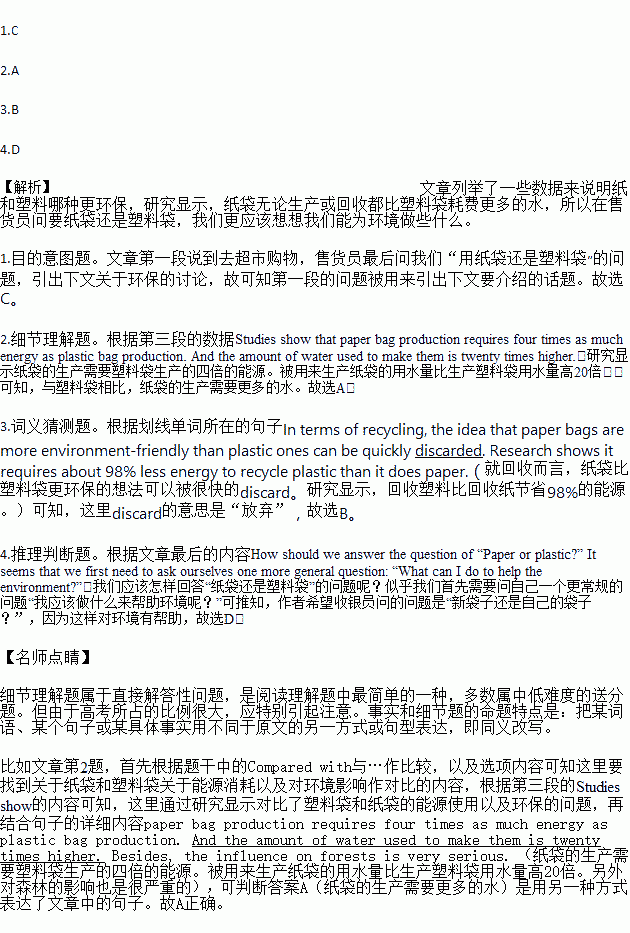题目内容
There was a time when a trip to the supermarket in the United States often ended with a seemingly simple question from the cashier: “Paper or plastic?” Well, which type of bag would you choose?
While all types of bags have some influence on the environment, it has long been supposed that paper bags are kinder. They are made from a renewable source, break down easily, burn without giving off thick smoke and can be recycled. However, the producing process behind paper bags uses more energy than that of plastic ones. How can this be true?
Studies show that paper bag production requires four times as much energy as plastic bag production. And the amount of water used to make them is twenty times higher. Besides, the influence on forests is very serious. It takes about fourteen million trees to produce ten billion paper bags, which happens to be the number of bags used in the United States yearly. In terms of recycling, the idea that paper bags are more environment-friendly than plastic ones can be quickly discarded. Research shows it requires about 98% less energy to recycle plastic than it does paper.
Even though paper bags might be more harmful than plastic ones, plastic still seems to be considered by governments as the more harmful of the two. In Ireland, for example, a tax has been introduced to discourage the use of plastic bags. People have to pay 22 cents for every plastic bag, and as a result, their use has dropped quickly.
There’s no doubt that it makes more sense to reuse these bags. However, we don’t seem to be doing that at present. That may be because they fall apart quickly. If so, cloth bags are a better choice, but still, their production also has a bad influence on the environment. So what to do? How should we answer the question of “Paper or plastic?” It seems that we first need to ask ourselves one more general question: “What can I do to help the environment?”
1.The questions in Paragraph 1 are used to ________.
A. express the author’s doubts
B. tell readers how to save money
C. introduce points for discussion
D. show the kindness of the cashier
2.Compared with plastic bags, paper bags ________.
A. need more water to produce
B. require less energy to recycle
C. take more time to break down
D. have less influence on forests
3.The underlined word “discarded” in Paragraph 3 probably means “________”.
A. shared
B. given up
C. discussed
D. put forward
4.Which question does the author probably hope the cashier will ask?
A. Paper or cloth?
B. Paper or plastic?
C. A small bag or big one?
D. A new bag or your own one?
 通城学典默写能手系列答案
通城学典默写能手系列答案 金牌教辅培优优选卷期末冲刺100分系列答案
金牌教辅培优优选卷期末冲刺100分系列答案Are you thinking about what to do in your free time? Come and join us —Yo uth Club! Join in lessons and activities. It’s fun! For more information, call 34789256!
uth Club! Join in lessons and activities. It’s fun! For more information, call 34789256!
Lessons | Activities |
Monday~Friday 6:00 p.m. ~7:30 p.m. Computer lessons for beginners | Saturday and Sunday 8: 00 a.m. ~9:00 p.m. Basketball and volleyball playgrounds open |
Monday and Wednesday 7:30 p.m. ~9:30 p.m. Dance lessons for dancer-lovers You can learn and enjoy wonderful dances | Monday ~Sunday Swimming pool open |
Tuesday , Thursday and Friday 6:30 p.m.~7:30 p.m. Cooking lessons Learn to cook delicious dishes from all over China | The second and last Saturdays of every month 7:00 p.m. ~9:30 p.m. Concert time Enjoy Swedish rock, American jazz and beautiful songs from different parts of the world! |
1.On which of the following days can’t you have computer lessons?
A. Monday B. Wednesday
C. Friday D. Sunday
2.Rose is free after 7:20 p.m. Which lessons can she take?
A. Computer lessons. B. Dance lessons.
C. Cooking lessons.  D. Both computer and cooking lessons.
D. Both computer and cooking lessons.
3.If Dick wants to swim after playing basketball, when can he go to the club?
A. Monday and Wednesday. B. Monday and Sunday.
C. Saturday and Sunday. D. Monday and Sunday.
4.How often can you enjoy music in the club?
A. Twice a month. B. Twice a week.
C. Four times a month.. D. Five days a week.

